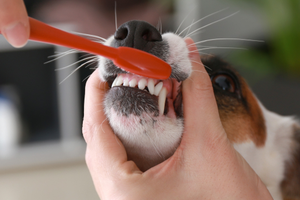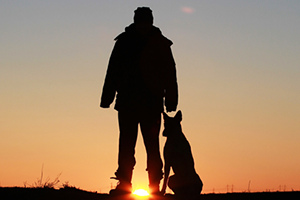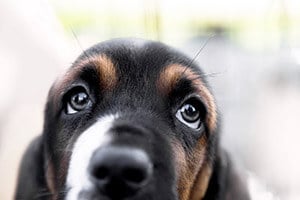Do dogs dream?
Quick Links
Do dogs dream like humans?
Of course, there’s a lot we’ll never know about how dogs dream – but science can go some way towards answering the question. We know dogs’ brains are pretty similar in structure to our own, and that they, like us, experience periods of REM (rapid eye movement) sleep. This is the phase of sleep in which humans experience most of our dreams – and the same is probably true for our dogs.
REM sleep usually starts around 20 minutes after your dog has drifted off to sleep, and lasts for two or three minutes. During this sleep phase, you might notice your dog’s eyes moving under their eyelids, and observe them making movements or noises that might give you a clue as to what they’re dreaming about.
What do dogs dream about?
You might not be able to ask your dog what they dreamed about last night, but scientists believe the content of a dog’s dreams is fairly similar to ours. Dreams help us process our day, and it’s likely that’s true of dogs as well. If they move their legs as if running, perhaps that’s exactly what they’re doing in their dream! And if they vocalise, they may simply be responding aloud to what’s happening in their heads – or they could be dreaming about communicating, with the people in their life or other dogs.
But dreams aren’t just a way of reviewing each day. They also help us learn. Scientists have discovered that during REM sleep, the neurons within the hippocampus – the part of the brain linked to memory and learning – are extremely active. This means it's likely that our dogs’ brains are finding shortcuts or connections between things they’ve experienced during the day. Been playing a new game – hide and seek, for instance? During REM sleep, your dog’s brain may be making new connections between the scent of their toy and how this helps them find where it’s hidden.
Do dogs dream about their owners?
How to help your dog get the best sleep
Assuming dogs do process the day through dreams the same way we do, there’s one easy way to help your dog have a great sleep – make sure they have a great day! Plenty of happy experiences, followed by drifting off to sleep in a safe and comfortable environment, should set them up best for a good night’s rest.
Disrupted sleep can prevent memories from taking root, so make sure your dog always has plenty of opportunities for uninterrupted sleep, both during the day and at night. Dogs also sleep more than us: an average of 14 hours for adult dogs, and up to 18 hours for puppies and older dogs, who might need a change in sleeping arrangements as they get on in years. Setting up a quiet and comfortable bed helps your dog feel secure when they sleep, meaning they’re more likely to reach the REM stage of sleep that’s essential for dreams.
If your dog seems very agitated during sleep, you might be worried they’re having a nightmare and feel tempted to wake them. In this case, it really is best to let your sleeping dog lie – if you wake them prematurely, they might startle or lash out. If your dog’s sleeping behaviour changes radically, it could be worth scheduling a veterinary check-up to rule out any underlying health concerns – but those everyday twitches and yelps in sleep are nothing to worry about. In fact, they’re a great sign your dog’s brain is processing all the day’s activities and creating happy memories as they recharge for further fun tomorrow!
Petplan is a trading name of Pet Plan Limited (Registered in England No. 1282939) and Allianz Insurance plc (Registered in England No. 84638), Registered office: 57 Ladymead, Guildford, Surrey GU1 1DB.
Pet Plan Limited is authorised and regulated by the Financial Conduct Authority. Financial Services Register No. 311969. Allianz Insurance plc is authorised by the Prudential Regulation Authority and regulated by the Financial Conduct Authority and the Prudential Regulation Authority. Financial Services Register No. 121849. Pet Plan Limited is a subsidiary of Allianz Insurance plc.








